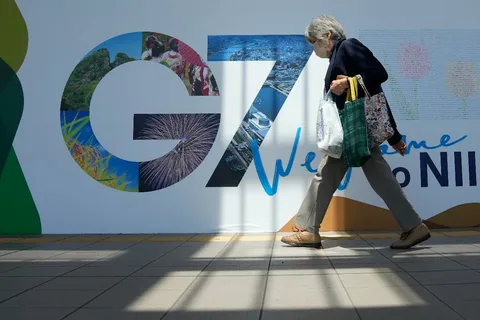G7 financial leaders have met this week in Banff, Alberta, with the intention of presenting a united front on urgent non-tariff issues and balancing domestic tensions, especially concerning US tariffs imposed under President Donald Trump. As the global economic climate remains fragile, G7 finance leaders are prioritizing discussions around economic security, AI cooperation, and Ukraine support over divisive tariff matters. The three-day gathering, from Tuesday through Thursday, features central figures like US Treasury Secretary Scott Bessent and finance ministers of Canada, the UK, Japan, Germany, France, and Italy.
Read More: Electric Truck Revolution: CATL Sparks China’s Green Freight Era
Shift from Tariffs to Economic Security and AI Cooperation
The host nation, Canada, is spearheading the process of refocusing the attention of the G7 finance leaders towards strategic topics such as global economic security, collaboration on artificial intelligence, and preventing non-market practices. G7 finance leaders plan to take a collective position in addressing topics such as the state-led Chinese economic model and the implications of market overcapacity.
US Treasury Secretary Scott Bessent, an alumnus of a hedge fund industry, is calling for an aggressive approach towards Chinese subsidized exports and unbalanced market conduct. These are at the forefront of the minds of G7 finance leaders, who are also drafting a common declaration to reassert their policy convergence prior to the G7 leaders’ summit in June. The group seeks to find common ground on more general economic risks without being diverted by negotiation over reciprocal US tariffs that can go as high as 20%.
Sanctions, and International Coordination
While a specific financial pledge like the $50 billion in loans observed in previous communiqués is not expected this time. G7 leaders are resolute in ratcheting economic pressure on Moscow.
The European Union is drafting a fresh sanctions package, and while consensus language is likely. G7 finance leaders are being careful not to overcommit. That way, they can remain collective even with geopolitical tensions. Concurrently, G7 finance leaders are reaffirming backing for such institutions as the IMF and World Bank and will emphasize measures against international financial crimes, including money laundering and illicit funding, at this summit.
Also Read: Goa Real Estate: UAE-India Property Show in Dubai
Tariff Differences Still Persistent in Bilateral Negotiations
While the summit is technically focused on non-tariff issues, tariff differences persist as an underlying factor. Finance leaders within the G7 are using behind-the-scenes bilateral negotiations to put pressure on Secretary Bessent to reduce US tariffs. Canada remains subject to a high 25% tariff, while Japan has been said to have progressed in negotiations to relax those restrictions.
In spite of such behind-the-scenes but insistent efforts. G7 finance leaders are determined to stay united but not to let disagreements on trade hijack headlines. Bessent, being a moderating voice in the Trump administration. It is regarded as the greatest hope for diplomatic resolve despite potential renewed tensions being triggered by climate policy talks. Trump’s earlier green energy scepticism remains an issue for G7 finance leaders. It promoting sustainable modes of investment to guarantee long-term global security.
G7 Finance Leaders Call for Convergence Before June Summit
The Banff conference is viewed as crucial in building momentum for the June G7 summit at Kananaskis. The host, Canada, is going all out to deliver a significant common communiqué. That captures common positions regarding Ukraine, AI, and financial stability. The G7 finance ministers appreciate the necessity of portraying strength at a time of global insecurity. Inflationary anxiety, and increasing fragmentation geopolitically.
By getting on board with non-tariff priorities today, G7 finance leaders want to enhance resilience in the global economy. Debate about taking advantage of private sector growth, updating financial regulation. Harmonizing AI regulation indicates the group is not only responding but actively charting its future. Although tariffs and climate tensions are still open, the atmosphere in Banff is firmly looking ahead.
A Few Final Thoughts
Despite economic pressure building and trade tensions remaining. G7 finance leaders are proving their commitment to collaborate on international financial stewardship. Their commonality on non-tariff fronts such as AI, Ukraine, and economic crime is an example of pragmatism in global relations. With a draft agreement close to being finalized, this summit may mark a more powerful. Wiser G7—set to shape tomorrow’s world economy, united.
For More Trending Business News, Follow Us 10xtimes News






